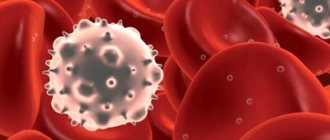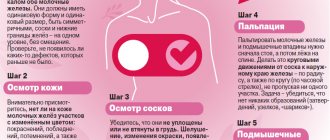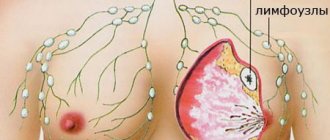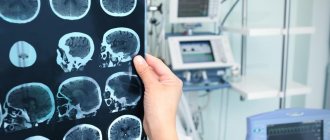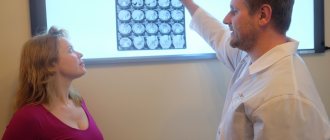Issues discussed in the material:
- Why does senile dementia develop?
- What are the symptoms, forms and stages of dementia
- How to diagnose senile dementia
- How to cure dementia
- How loved ones can help someone with senile dementia
Not all elderly people can clearly express their thoughts, reason logically, or maintain their sanity. Only a third of pensioners over 80 years of age have a clear mind, 70% have impaired thought processes and memory loss. Such disorders are simply called senile dementia, and in medicine - senile or senile dementia. What therapy is prescribed for the treatment of senile dementia, as well as the reasons for its occurrence, will be discussed in detail in this article.
General information about dementia
The popular name for dementia is senile insanity or senile dementia. Most often, this disease occurs against the background of aging of the body and accompanying changes. Dementia usually develops after the age of 65, but due to certain diseases, intoxications or injuries it can appear at an earlier age. Damage to the central nervous system is irreversible; properly selected treatment can only stop the process, but not reverse it.
A mild form of the disease occurs in about one in ten people over 65 years of age, and 5% of older people develop a severe form. It leads to a complete loss of the ability to self-care, as a result of which the patient requires constant care and observation. Women are affected twice as often as men.
Make an appointment
What should relatives of a patient with senile insanity do?
The prognosis of senile dementia is unfavorable and it cannot be cured. The process of mental disintegration of the sick person lasts from one to ten years.
However, with timely diagnosis and proper treatment, the progression of the disease can be significantly stopped and the patient’s quality of life can be improved. The task of relatives is to have a patient and condescending attitude towards the elderly and provide him with comfortable conditions. It must be remembered that personality changes occur not through the fault of the elderly person, but precisely because of illness.
Regular intake of prescribed medications, as well as a comprehensive program of exercises and a properly organized daily routine, regular walks and exercises will help your patient to alleviate the course of the disease as much as possible.
Causes
The causes of dementia are diseases and conditions that cause degeneration and death of brain cells:
- Alzheimer's disease;
- Pick's disease;
- severe atherosclerotic damage to the vessels of the neck and brain;
- hemorrhagic and ischemic strokes, as well as transient ischemic attacks;
- arterial thrombosis;
- severe arterial hypertension;
- diabetes mellitus (high blood glucose causes angiopathy - damage to small vessels with subsequent oxygen starvation);
- acute and chronic intoxication (including alcohol);
- neuroinfections (encephalitis, meningitis);
- head injuries (concussions, brain contusions);
- malignant and benign brain tumors.
The presence of dementia in parents or other older relatives significantly increases the risk of developing the pathology. Predisposing factors also include excess body weight and insufficient intellectual functioning throughout life.
Help for pensioners with dementia in boarding houses "Longevity"
Caring for dementia patients at home is extremely difficult and requires a lot of effort and patience. Not everyone can bear all the hardships that fall on the shoulders of the relatives of the sick person, and conditions do not always allow for proper care and medical assistance at home, which is constantly needed. Often in such a situation, all family members are stressed, and their usual way of life is disrupted.
Private boarding houses for the care of the elderly “Longevity” are ready to provide assistance and care to people suffering from senile insanity at any stage of the disease, including bedridden patients. Here, a whole team of professionals works with patients, providing round-the-clock monitoring and care, as well as the necessary treatment, diet and psychotherapy.
Types of pathology
There are several types of classification of senile dementia. The most common is based on the mechanism of development of the disease. The following types of pathology are distinguished:
- Alzheimer's (atrophic): based on a degenerative process in the cerebral cortex, most often found in Alzheimer's disease;
- cerebrovascular: occurs against the background of chronic insufficiency of blood supply;
- mixed.
The location of pathological foci is the basis of the second classification: cortical, subcortical, mixed and multifocal forms of dementia are distinguished.
Clinical manifestations allow us to distinguish two variants of the disease:
- lacunar dementia: mainly the intellectual sphere suffers, memory suffers, but the person is aware of himself and can assess his condition;
- total: loss of self-service skills and inadequate perception of reality.
Types of senile dementia
For each type of senile dementia, there are different signs of its manifestation:
Vascular dementia.
Initially, a decrease in attention and concentration appears. Then the patient quickly gets tired and gets irritated. He may be bothered by pain in the head and neck area. Insomnia or, conversely, excessive sleepiness appears. A person can sleep either 4–5 hours or the whole day.
Memory impairments are still not clearly expressed. But you should pay attention to the manifestation of emotions. Sick older people are subject to rapid changes in mood. They are indifferent to surrounding events and suffer from hallucinations. Epilepsy attacks may occur. The mobility of the limbs and gesturing decreases. Facial expressions become less pronounced. Dysuric disorders occur. Such people are unkempt and indifferent to daily self-care.
Atrophic senile dementia.
The main signal of this stage is a process that is accompanied by the inability to save, accumulate and use the information received. Simply put, memory impairment. In mild cases, this results in forgetting the events that just happened. The severe form is characterized by the inability to remember the events of several past years and loss of space. The vocabulary becomes impoverished and attention wanders. But with this form of senile dementia, glimpses of consciousness are possible, when the patient understands the severity of his illness and can somehow mask his illness.
Doctors divide forms of atrophic dementia according to the following criteria:
- Partial dementia. Expressed in memory deterioration, loss of strength, lethargy. Often the patient is depressed.
- Epileptic dementia. Clear signs appear over time. A sick person is characterized by attacks of aggression, anger, and rancor. They can perform actions carefully, consistently, often with diligent repetition. Speech inhibition is observed, interest in what is happening around disappears.
- Schizophrenic dementia. This condition requires constant supervision of the patient, preferably in a specialized institution. This form is characterized by deep withdrawal into oneself, loss of emotionality and activity.
- Alzheimer's disease. It is worth taking into account that this disease can be inherited. The onset of painful processes is possible before the age of 60, but often the likelihood increases sharply by the age of 65–75.
Initially there is memory deterioration. Distracted attention, forgetting any things or events do not bother a person at first. An alarming signal is when the patient systematically cannot remember episodes that occurred recently. However, older people remember events that happened ten years or more ago very well and in detail. But over time they are also forgotten.
The patient cannot recall in memory the data that he needs at a certain moment. The information just received is also not perceived. There is disorientation in place and time. An elderly person cannot remember the date of today, where he is now and does not even recognize himself, his family, or his friends. Along with this, vision and hearing decrease, and sensitivity decreases.
Next, the person ceases to identify himself with the outside world. The knowledge and skills associated with his profession decrease and then disappear altogether. The situation gets worse when the patient cannot cope with personal needs, the vocabulary becomes poorer, and diction is impaired.
In the early stages, older people still understand that an illness is emerging and make attempts to resist it. But with the progression of senile dementia, the critical assessment of one’s own condition decreases. Interest in his hobbies and events around him disappears, the patient withdraws and withdraws into himself.
- Pick's disease. The same applies to atrophic senile dementia, only more global. Women are often susceptible to this type of dementia.
Appears as a result of destruction and death of the cerebral cortex in the frontal and sometimes temporal lobes. Disease processes affect the emotional sphere. A person's critical self-esteem disappears. He ceases to control himself and falls into opposite emotional states (apathy, euphoria). Swears with obscene words, makes scandals for no reason.
Patients with this diagnosis are characterized by lustful behavior and the inability to control feelings of lust. A person changes before our eyes and can behave antisocially. There are no speech impairments; on the contrary, it is fast and with many words, but there is a problem with the correct use of terms and expressions. Thought processes are preserved, but the patient cannot analyze or draw correct conclusions based on the information received.
The acquired skills in counting, writing, and those related to professional activities remain for a long time. Memory does not deteriorate as much as in Alzheimer's disease, that is, the patient does not fall into an unconscious state.
Mixed dementia.
This type of senile dementia occurs as a result of destructive, destructive actions associated with the use of drugs, substances that change the human psyche. This question is relevant for those people who have been taking psychotropic drugs prescribed by psychiatrists for several years. These substances must be taken in courses. Long-term use leads to acute poisoning of the body, which can develop into dementia.
In addition to the state of causeless inspiration and enthusiasm, a persistent attachment to these substances appears. Their accumulation in the body leads to serious disorders of mental processes. With addiction comes emotionally unstable states, frequent mood swings, and blues. All this is aggravated by loss of strength, weakness, lethargy and insomnia. As a result, a severe mental disorder on the verge of insanity occurs, the person ceases to perceive the reality around him.
Reality is not a stimulus to action. The use of poisonous drugs and isolation from reality accelerate the degradation of personality. But such patients have a much higher chance of recovery and adaptation to normal living conditions than patients with Alzheimer's disease and vascular dementia.
We recommend
“Causes of itching in older people and ways to combat the disease” Read more
Severity
There are three degrees of severity of pathology:
- mild: there is a decrease in short-term memory, emotional instability, inability to remember new things; the person can take care of himself independently and understands the need for treatment;
- moderate: self-care becomes difficult; a person begins to forget about basic actions (close the door, turn off the gas), and may get lost on the way to the store; already at this stage the patient requires constant monitoring;
- severe: complete loss of the ability to self-care and critical perception of reality, the need for constant care.
Stages of senile dementia
There are three stages of the disease, which can be roughly distinguished by symptoms:
- Lightweight (mild symptoms) - impairment of intellectual abilities with preservation of independence and previously acquired skills.
- inability to perceive new information and decreased intelligence;
sudden mood swings, depression;
- memory problems (a person forgets dates, names, recent events);
- insomnia or poor sleep due to anxiety;
- loss of interest in favorite activities.
- Moderate - worsening of primary symptoms and cognitive disorders, decreased critical perception, addition of new symptoms.
- at this stage, a person experiences difficulties in using familiar household items (household appliances, door locks, intercom, etc.);
the patient cannot concentrate on something for a long time;
- memory deteriorates greatly (an elderly person does not remember recent events, does not remember what he has just read, forgets the names of his loved ones and good friends, and may get lost in an unfamiliar place);
- aggressive behavior followed by apathy;
- inadequate perception of the surrounding world intensifies and instincts become more acute (a person becomes suspicious, it seems to him that something is being plotted against him, etc.);
- neurological disorders are possible - urinary incontinence, falls, hallucinations, epileptic seizures.
- Heavy - loss of independence, self-control and memory; at this stage, the patient requires constant monitoring and care.
- the patient may become aggressive, not recognize loved ones, and his behavior becomes inappropriate;
a person does not remember his name and age, does not recognize himself in the mirror;
- speech becomes very poor, reading and writing skills disappear;
- a person becomes incapable of self-care; he must be fed, changed, washed, and under no circumstances left unattended.
Symptoms
The main symptoms of dementia occur in all forms and types of the disease. They include:
- decreased short-term memory;
- difficulty in perceiving new information, learning new skills (for example, working with a computer or smartphone);
- viscosity of thinking: the patient takes a long time to think, he needs more time to solve any problems or issues;
- speech difficulties: slurred pronunciation, difficulty finding words;
- impaired coordination of movements, especially fine motor skills;
- uncertainty, unsteadiness of gait;
- inappropriate behavior: patients become overly sweet or, conversely, aggressive;
- disorientation in space and time.
Different types of dementia have their own characteristic symptoms. For example, the Alzheimer's type is manifested mainly by mental and memory disorders, changes in thinking, and inappropriate behavior. The vascular form of the disease is characterized by both intellectual and motor impairments, and dementia with Lewy bodies often takes on the character of a psychiatric pathology and is accompanied by hallucinations, delusions, insomnia and depression.
Symptoms of the disease
It is not always possible to recognize the disease at the initial stage, since with age, to one degree or another, any person’s personality changes and the first symptoms of dementia are often mistaken by non-specialists in the medical industry for ordinary manifestations of old age.
At an early stage, the disease can be distinguished by a change in character - the patient’s negative traits worsen. People with senile dementia are characterized by frequent mood swings, hysterics, gloominess, isolation, and grumpiness.
As the disease progresses, senile patients completely stop caring for themselves and even forget about basic hygiene. Very often, elderly people with dementia suffer from pathological greed; they steal all sorts of rubbish and rubbish into their home, do not throw away and do not allow other family members to throw away unnecessary things. If a person with such a disease is alone, it often happens that his house is completely filled with rubbish and this is discovered only when the smell bothers the neighbors.
Elderly people with dementia living in families cease to be interested in their loved ones and take care of them, they forget the faces of their own children and grandchildren, they are indifferent to the people around them. In patients with dementia, instincts become more acute and socialization decreases.
Diagnostics
Neurologists and psychiatrists diagnose dementia. The examination includes:
- collecting complaints and medical history, determining the approximate time of onset of the disease, the most pronounced signs, as well as concomitant pathology;
- detailed neurological examination with assessment of reflexes, motor and sensory function;
- general urinalysis, general and biochemical blood tests, tests for hormones, infections, electrolytes, determination of basic blood clotting indicators;
- ECG, ultrasound of the heart;
- CT or MRI of the brain to detect structural lesions;
- Doppler ultrasound of neck and brain vessels;
- electroencephalogram (EEG);
- neuropsychological tests to assess the state of the psyche and the quality of thinking.
If necessary, a more detailed diagnosis is carried out.
Diagnosis of senile dementia
In case of memory disorders, disturbances in mental processes, changes in human behavior, frequent mood changes, before starting treatment, you should consult a general practitioner. He will analyze the patient's complaints, examine him, and assess his mental state. If necessary, he will refer you for a consultation to a specialized doctor, who will make an accurate diagnosis and prescribe treatment.
Diagnosing a decline in brain processes at the initial stage includes answering easy speed questions, solving simple arithmetic problems, and listing events that have occurred in the recent past. At this stage it is too early to prescribe any treatment.
The final conclusion about senile dementia is made based on typical symptoms that persist for 6 months or longer.
It is also necessary to find out whether any of the relatives suffered from mental disorders or senile dementia. Accurate results of disorders are obtained using MRI and ECG. Infectious causes are identified using a lumbar puncture (lumbar puncture). Such disorders cannot be detected using a general blood test.
If the patient has diseases, including chronic ones, special medical examinations are also prescribed, depending on the symptoms. Various studies are being done to rule out false dementia. After all examinations, a treatment program is developed.
The likelihood of stopping the progression of the disease increases if you notice the symptoms in time, undergo diagnosis and begin therapy.
We recommend
“Adaptation of older people: in modern society and boarding homes” Read more
Dementia treatment
Treatment depends on its type and extent. The main task of the doctor is:
- normalization of the patient's behavior;
- improving the functioning of the central nervous system;
- improving quality of life.
For mild forms of the disease, the drugs of choice are:
- sedatives for excessive anxiety;
- antidepressants to improve emotional state and correct memory;
- means for improving brain activity that improve the conduction of nerve impulses (donezepil and drugs based on it, neuromidin).
Psychotherapy helps slow the progression of the disease in the first stage. The patient is taught special exercises to train memory and logical thinking. With regular exercise, patients become more adapted to everyday life, and the process of degradation slows down.
Moderate dementia requires the use of drugs to protect nerve cells (Actovegin, Cerebrolysin), as well as drugs to restore memory and thinking (Phenibut). Hypnotics or sedatives may be used symptomatically.
For severe dementia, powerful drugs that stimulate brain activity (memantine, rivastigmine) are used. They are taken constantly and allow the patient to maintain a relatively clear consciousness for as long as possible. For aggressive behavior and hallucinations, antipsychotics (haloperidol) are prescribed.
Selecting medications to support a patient with dementia is a complex task that requires constant interaction between the doctor, the patient and his relatives.
Make an appointment
Causes of dementia
What are the causes of the death of nerve cells in the brain and the development of acquired dementia? Doctors agree that brain disorders can be caused by many different diseases and negative factors that can destroy brain vessels:
- Diseases of the vascular system Disturbances in the functioning of blood vessels lead to a lack of blood and oxygen supply to brain tissue with all the ensuing consequences;
- Infectious diseases Damage to brain tissue by various viruses, bacteria or toxins due to encephalitis, meningitis, AIDS and other viral diseases often leads to disruption of brain activity;
- Oncological diseases Various tumors, hemorrhages and inflammatory processes affecting the cerebral cortex often cause various disorders with signs of dementia...
- Traumatic brain injuries Physical destruction of brain tissue naturally leads to the death of nerve cells.
- Alcohol and drug abuse Long-term destructive effects of various toxins on nerve cells cannot but affect brain activity.
- Metabolic disorders A whole bunch of hormonal diseases, kidney and liver diseases lead to the accumulation of harmful substances in the blood that adversely affect brain activity.
There is no point in listing all the “risk factors” that, according to modern medicine, can lead a person to dementia. In such a situation, it would seem like a miracle for any person to live to be 80 years old and retain his sanity.
On the other hand, it is never possible to say exactly what exactly was the impetus for the development of senile dementia. If this misfortune happens to a loved one, be patient and contact a specialist...
Caring for a person with dementia
Having a relative with advanced dementia is a real challenge. The behavior and well-being of the patient depends on the behavior of the people around him, which is why it is important to devote a sufficient amount of time to care. To maintain a relatively stable patient's condition, it is recommended:
- organize a clear, understandable and stable daily routine;
- involve a person in family life and communication as much as possible;
- constantly stimulate thinking: solve crosswords, play chess, read and discuss what you read;
- give small tasks around the house so that the patient feels important and useful;
- avoid conflicts, violence, bullying, and excessive care.
As dementia progresses, it is recommended to make your home as safe as possible by removing any dangerous objects and securing heavy furniture. The patient needs constant observation and control, since he can harm himself or get lost simply by leaving the house. Severe degrees require constant care: feeding, hygiene procedures.
Signs of dementia
The aging process is always accompanied by various changes in human behavior, but changes are different from changes. Indirect signs of senile dementia in a person may include the following behavioral deviations:
- Experiences temporary memory lapses;
- Forgets the location of ordinary things in the house, while accusing loved ones of theft;
- Experiences frequent sudden changes in mood;
- Often becomes depressed and loses interest in life;
- Loses simple household skills (tying shoelaces, boiling a kettle, turning on the TV...);
- Experiences problems with speech (slowness, distortion of speech);
- Ceases to understand interlocutors, repeatedly asks to repeat what was said;
- Loses orientation in time and space;
If you notice such symptoms in a loved one, you should contact specialized institutions. According to doctors, the progression of the disease can be slowed down with proper medical care.
Prevention
Prevention of dementia helps not only to prevent the development of this pathology, but also to slow down the progression of the process that has already begun. Doctors recommend:
- be promptly examined and treated as necessary;
- avoid excess body weight;
- stop smoking and drinking alcohol;
- regularly engage in amateur sports to maintain tone (walking, swimming, yoga, etc.);
- eat properly and balanced, drink enough clean water;
- avoid stress, physical and mental fatigue;
- engage in mental work regularly.
Rules of communication when a relative has insanity
It is important to remember that insanity is a serious personality change. You will not be able to communicate with your parent as before. Moreover, habitual forms of communication can enhance unwanted manifestations, provoke aggression and break off emotional contact.
- Avoid derogatory language, insults and displays of anger towards the patient. He is not able to think critically and can involuntarily offend. It is important not to take it personally and realize that this is a consequence of the disease.
- Simplify your speech when addressing a relative, choose a friendly intonation, as a person with dementia ceases to understand complex phrases and focuses more on the tone and facial expressions of the speaker. Harsh notes can cause fear and crying, even a hysterical attack.
- Chat with your loved one on topics that are familiar and interesting to him, share family news and events, ask about his past. This stimulates mental functions and will help to distance misrecognition and withdrawal. Good contact with a loved one will reduce anxiety and worry.
- Be interested in his wishes. People with cognitive impairments often stop taking initiative in communication. It is difficult for them to express their request. However, they become very offended when they remain unheard, which, again, can provoke an attack of psychosis.
Treatment at the Energy of Health clinic
Neurologists at the Energy of Health clinic offer the most effective treatment and prevention methods for senile dementia today:
- reliable drug regimens that are selected on an individual basis;
- course treatment using intravenous infusions (droppers) in a day hospital;
- Psychiatric consultations and psychotherapy;
- training in home prevention and patient care.
We will conduct a full examination of the patient to identify concomitant pathologies and select medications with a minimum number of contraindications, as well as organize spa treatment if necessary.
Diagnosis
An accurate diagnosis, determining the type of dementia and the degree of development of the probable causes of the disease, can only be made by a doctor (neurologist or psychiatrist). To do this, data is collected on the signs and course of the disease, the patient himself, close friends and relatives living with him are interviewed. Various medical examinations are carried out: cerebral vascular examination, blood tests, MRI... The patient is tested using neuropsychological screening scales.
Advantages of the clinic
The Health Energy Clinic provides qualified medical care in various areas. We offer each patient:
- screening diagnostic examinations;
- targeted diagnostics using modern equipment and laboratory research;
- consultations with experienced specialists who regularly improve their skills, as well as foreign experts;
- individual selection of complex treatment;
- disease prevention activities;
- organization of sanatorium-resort treatment according to indications;
- own day hospital for course treatment.
Senile dementia turns the life of a person and his family into a real hell. Do not allow the disease to progress. Sign up your loved ones for an examination at Health Energy and let our specialists choose the most effective treatment.
Care, recovery, rehabilitation, elderly people with dementia
Our boarding house staff have the necessary skills and experience working with patients suffering from various cognitive impairments. Our nurses and carers know how to care for older people with memory loss and ensure their safety. We provide:
- adapted, safe premises for people with brain disorders;
- constant supervision by trained staff of the boarding house;
- balanced dietary nutrition, taking into account age needs and medical recommendations;
- assistance to residents of the boarding house in eating, hygiene procedures, careful care for bedridden patients;
- necessary medical procedures, exercises to support cognitive skills, motor skills;
- psychological assistance during rehabilitation.
Types of dementia
Experts classify the disease into three areas. They are distinguished by the extent and selectivity of damage to the body:
- Atrophic (Alzheimer's) - occur due to malfunctions of the nervous system.
- Vascular – acts as a concomitant disease, the primary source of which is impaired blood circulation in the brain.
- Mixed - combines the features of the vascular and atrophic types.
According to statistics, atrophic type dementia is more common in older women than in men.
The classification of dementia depending on the location of the brain lesion is as follows:
- cortical - the cerebral cortex is primarily affected (Pick's disease or Alzheimer's disease);
- subcortical – pathology affects subcortical structures (Parkinson’s disease with neurological symptoms);
- cortical-subcortical – there are disturbances in both the cortex and subcortex;
- multifocal – damage to the nervous system in all parts.
There are lacunar and total dementia. In the first case, there is damage to the structures responsible for intellectual activity. A person cannot remember what happened to him 5 minutes ago, but at the same time he calmly reproduces in his memory the events of twenty years ago. His short-term memory suffers, and a number of associations are significantly impoverished. His intelligence fails, sometimes even simple things become inaccessible to understanding. The patient is critical of his condition and is aware of the problem. The emotional-volitional sphere is practically not affected; symptoms include increased sensitivity and tearfulness.
In the case of total dementia, the situation looks much more serious. This type of disease is accompanied by gross changes in the intellectual and emotional-volitional spheres. Life interests are lost irrevocably, moral values fade into the background, and there is no sense of shame for unseemly actions. Such patients cannot remain full-fledged members of society, as they are completely maladapted. Our clinic treats suicidal behavior and senile dementia using new, safe methods.
Dementia - how to behave with a person?
First of all, have a positive attitude when communicating with your sick relative. Speak only in a polite, pleasant tone, but at the same time clearly and confidently. When starting a conversation, attract the patient's attention with his name. Always formulate your thoughts clearly, expressing them clearly in simple words. Always speak slowly and in an encouraging tone. Clearly ask simple questions that require clear answers: yes, no.
For difficult questions, give a hint. Be patient with the patient, give him the opportunity to think. Repeat the question if necessary. Try to help your relative remember a specific date, time, and names of relatives. It is very difficult to be understanding. Do not react to reproaches and reproaches. Praise the patient, take care of the consistency of his daily routine. Break down any activity into steps. Reminisce about the good old days with the patient. It's calming. Good nutrition, drinking regimen, and regular movement are important.
Registration of a sick person in a boarding house for the elderly
The nursing home is ready to gladly accept even those people who have senile dementia. The private boarding house "Valentina" offers first-class care for sick people. All requests and wishes of both the elderly person and his close relatives are taken into account here. In this boarding house, specialists monitor the health status of each client every day. If necessary, they provide the patient with first-class medical care. This institution has everything necessary to ensure complete safety for people with this illness. The nursing home is located in a picturesque corner of the Moscow region. It is surrounded by a tennis park where people can enjoy walks and a lake, which creates a comfortable atmosphere.
Unfortunately, senile dementia is a very dangerous and unpleasant disease that brings discomfort to both the patient and his loved ones. Not all relatives have the time and energy to constantly be near an elderly person. In order not to provoke unpleasant situations, it should be registered in the private boarding house “Valentina”. It employs highly qualified personnel who take their duties responsibly. Here, customer service is provided at the highest level, as a result of which not only he, but also his loved ones will be satisfied. Professional help will be needed if a person with dementia behaves aggressively or distractedly. Patients who cannot care for themselves also require special care and treatment. The nursing home employs responsible people who are ready to take full responsibility.
For guests with senile dementia in a private boarding house the following is offered:
- well equipped private room;
- constant surveillance;
- daily health check;
- accommodation at an affordable price policy;
- six dietary meals a day;
- moral support;
- 24-hour professional care;
- treatment control.
Unfortunately, it is now impossible to get rid of senile dementia forever. But modern medicine offers special medications that slow down the development of this disease. This treatment alleviates the plight of both the patient and his loved ones. Psychosocial rehabilitation is also an integral component of effective therapy.
The private boarding house offers guests the following:
- Creating a comfortable atmosphere. The effectiveness of treatment largely depends on the situation.
- Respectful attitude of the staff towards every elderly person. Nursing home workers are ready to feed the patient, wash him, etc.
- Safe living. The presence of anti-slip flooring, handrails, and a small amount of furniture guarantees complete safety for a person with senile dementia.
- Respectful attitude and constant support. Specialists communicate with people, listen to their requirements and wishes.
You can book a room for an elderly relative by calling 8-495-003-19-56 or using the online call back form.
Features of dementia in Alzheimer's disease
With this disease, symptoms of intellectual decay most often appear.
Patients gradually develop:
- The first signs of senile dementia are deterioration of short-term memory (with intact criticism).
- Worsening mental problems. Initially, the patient loses the ability to remember recent events, then past ones (moving back in time).
- Loss of ability to recognize people.
- Loss of the ability to remember what the patient just did.
- Confabulations are false interpretations of events that did not occur.
- Gradual decrease in criticism.
- Emotional and volitional disorders: dissatisfaction with the actions of other people, grumpiness, pettiness, irritability.
- In the advanced stage, the development of delusions of harm, vagrancy, impoverished speech, and delirium are noted. Patients stop eating and are motionless all the time.
The advanced form has an unfavorable outcome.
Research Facts
One 2013 study from the Nizam Institute of Medical Sciences in India found that speaking two languages may delay the development of dementia. An analysis of medical records from 648 cases of dementia found that those who speak two languages develop dementia an average of 4.5 years later than those who speak only one language.
Recently, studies have appeared indicating a slight decrease in the percentage of people suffering from dementia in the total number of elderly people in developed countries. So, if in 2000, 11.6 percent of people over 65 in the United States had dementia, then in 2012 there were much fewer of them: 8.8 percent.
There are 16 scientific studies demonstrating the effect of phosphatidylserine on reducing symptoms of dementia or cognitive impairment[5]. In May 2003, the US Food and Drug Administration (FDA) approved a Qualified Health Claim for phosphatidylserine, allowing US manufacturers to state on their labels that “Consumption of phosphatidylserine may reduce the risk of dementia and cognitive impairment in older adults.”
However, this statement must for now be accompanied by the caveat that “very limited and preliminary scientific research suggests that phosphatidylserine may reduce the risk of cognitive dysfunction in older adults,” since the Agency considered that the scientific community is still divided on this topic, and the majority The studies were done using phosphatidylserine derived from cow brain rather than the soy phosphatidylserine that is currently used.
Diagnosis of the disease
Suspicion of dementia is a good reason to see a doctor. This pathology is dealt with by a therapist, a neuropsychologist, a neuropathologist, a psychiatrist and a specialist who deals with diseases of the elderly. The diagnosis is made after interviewing the patient’s relatives and the patient himself. Important information is:
- age;
- characteristic signs;
- frequency of symptoms;
- time of onset of pathology.
A comprehensive neurological examination using modern equipment allows us to determine where the foci of pathology are located. The diagnosis is finally made only when symptoms are observed for six months and intensify over time.
A number of psychological tests are carried out to assess cognitive function. They make it clear at what level of consciousness the patient is. During testing the following is established:
- degree of orientation in space;
- features of attention;
- volume of short-term and long-term memory;
- thought processes (abstract, logical);
- the presence or absence of hallucinations, illusions;
- ability to think critically and plan.
Symptoms of dementia
Senile dementia begins with mild symptoms that can easily be mistaken for a normal personality change in old age. If you notice the following signs in older adults, you should start to worry.
- Behavioral destruction is characterized by manifestations of sloppiness and carelessness in clothing. Carrying out basic actions regarding personal hygiene requires reminders. Work and usual actions become uninteresting, persistence in proving one’s own rightness and edification develops. In certain situations, the patient is easily suggestible. Indifference also develops in relation to everything that has nothing to do with the patient’s personality. Often shyness disappears, this feeling is replaced by promiscuity, the patient prefers conversations with erotic overtones.
- Memory impairment is caused by organic brain damage. The patient may forget yesterday's events, but remembers long-past events with great detail. The patient may not remember important events, as well as the dates of the current day.
- Thinking deteriorates significantly, habitual daily tasks are solved with great difficulty, and difficulties arise when it is necessary to make a choice in favor of an effective solution to a problem.
- Orientation in time space is disrupted, but only in cases where the patient is in an environment that is unusual for him. At home there are no problems with the sense of time, but in an unfamiliar place it can get lost.
- In the first stages of the disease, a person is characterized by loquaciousness, habitual speech is preserved, as well as facial expressions, gestures and the appropriate use of formulaic expressions. Stereotypical behavior and the use of patterns in communication can cause senile dementia not to be noticed on time. Accidental diagnosis is possible only when the patient is unable to answer a randomly asked question about age, date or time.
Senile dementia in older people provokes the development of stinginess and greed; patients often begin to collect unnecessary things at home in large quantities.
Hypersexuality and excessive appetite characterize the initial stages. Self-care skills are lost as the disease develops, decades disappear from a person’s memory and it seems to him that he is young and does not yet have any grandchildren or children.
Periods of depression, sentimentality, anger or aggression often occur.
Stages of dementia development
The stages of the disease are varied and depend on the type of dementia. However, common features can be identified - the classification is based on the severity of the process:
- Mild dementia (initial stage). The onset of the disease is characterized by slight and at first glance curious forgetfulness. People “automatically” close the TV remote control into the refrigerator, and put the key to the intercom to the elevator call button. Then fixation amnesia appears, when new information flies out of the head. Some character traits can become aggravated to the point of absurdity: a thrifty person turns into a plushkin, a purposeful person turns into a stubborn tyrant. With timely correction, it is possible to slow down the processes of destruction of brain cells. The participation of the family is important, which must create favorable microclimatic conditions for the patient, surrounding him with care and love
- Moderate dementia. Events that happened in a more distant period of time are forgotten, while the person remembers childhood and youth. Failures are replaced by fictional episodes, events move in time: the grandfather is going to lecture at the university he graduated from 50 years ago, the “pregnant” grandmother buys diapers. Practical skills are impaired and they cope only with the simplest household chores. Dementia makes people a danger to themselves and others. Difficult to treat, which is aimed at stabilizing the patient’s condition. The prognosis is unfavorable because the disease tends to progress
- Severe dementia. The very last stage. The patient’s symptoms progress, and physical functions are impaired. A person stops recognizing close people. As a result of dementia, the patient experiences complete personality degradation. The prognosis is the most unfavorable. As a result, dementia leads to death, since impaired immune reactions lead to death due to the inability to fully control all processes in the body.
